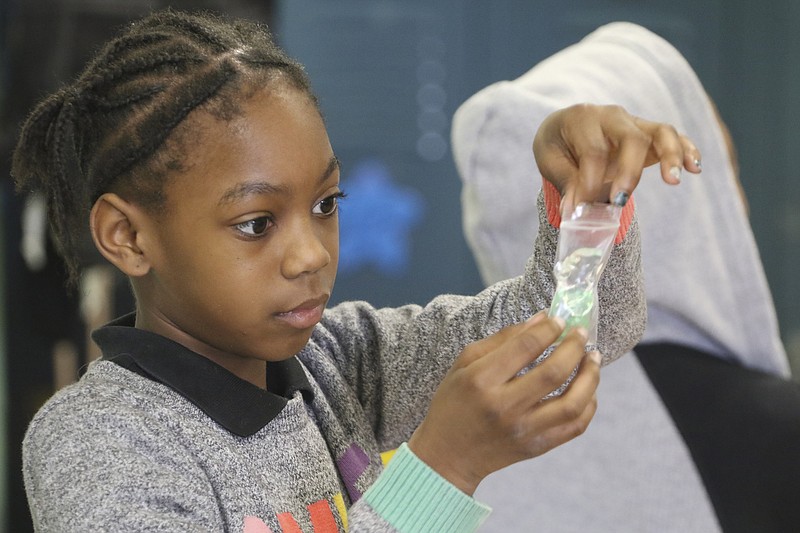It's morally indefensible for public education advocates to force students to attend poorly performing schools year after year in hopes the schools eventually will improve when those students might be given another choice.
That argument is playing out at the state level with a voucher bill that passed the Education Administration and Planning Committee last week and on the national level with the interest by President Donald Trump and by Secretary of Education Betsy DeVos in offering students more education choices.
The voucher bill targets Shelby County only and is, like previous attempts at passing such legislation, only a pilot program. In other words, if it proves unsuccessful at moving scholarship students ahead in the private schools they would attend, it ends.
For some students, whose parents long for other choices, their current situation hardly could be worse.
A Memphis state legislator and a Democrat - whose party is dead-set against such student improvement options unless it is through the public school route - maintained poor public schools trap students.
They can't read on an elementary school level, can't pass college entrance exams and can't get into the military, said Rep. John DeBerry, D-Memphis.
"The school system controls all the funds for a hundred years," he said in an argument with a Memphis area resident following a recent committee meeting, "and the children still fail."
Make no mistake, though, the national opposition to school choice is fierce - from the powerful National Education Association union, which doesn't want to lose a dime, from Democrats, who want choice for abortions but not for students, and from the national media, which take their cues from left-wing politicians.
The voucher bill, sponsored by Rep. Harry Brooks, R-Memphis, allows low-income students in Shelby County, whi ch has about 30 schools on the state's priority schools list, to attend private schools which agree to participate on approximately $7,000 per student of state funds. The schools, in turn, must follow various federal and state standards.
The program would begin with up to 5,000 students in the first year and increase up to 20,000 students (13.3 percent of the county's 150,000 students) in the final year of its pilot program.
Even at its maximum, it's a small percentage of students who would have an opportunity at a better education. Why, since it's not forcing a parent to do anything, would education advocates not want such an opportunity for students in struggling schools?
After all, it's not, as DeBerry told WATN-TV in Memphis his Democratic colleagues were suggesting, " [the] apocalypse, the zombies are coming, everything is going to fall apart, and so forth."
The Shelby County bill, nevertheless, has a long way for passage. The House version needs to pass three other committees before reaching the House floor. The Senate version, sponsored by Sen. Brian Kelsey, R-Germantown, has cleared the Senate's Education Committee.
Another bill in the House Education Administration and Planning Committee is similar to previous unsuccessful voucher bills that would affect students in several counties, including Hamilton. However, its Senate version was on life support late last week after failing to get enough votes to move it forward.
President Trump, in his first address to Congress, urged Congress "to pass an education bill that funds school choice for disadvantaged youth, including millions of African-American and Latino children." He said they "should be free to choose the public, private, charter, magnet, religious or home school that is right for them."
How that would occur neither he nor DeVos have yet to delineate.
On the surface, it's hard to argue with the secretary of education's contention that "education dollars [should] follow each child," as she explained in a 2015 speech.
"This is pretty straightforward," she said. "And it's how you go from a closed system to an open system that encourages innovation. People deserve choices and options."
In other words, when there's competition for the public dollar, participants who want the lion's share of that dollar will try a little harder, attempt new things and make changes where the "same ol' thing" has become ingrained. Such competition can't help but improve all schools, we believe.
On the other hand, we're not ready - at least not yet - to allow public education dollars to be diverted to every choice available. Public schools were created to educate, with reasonably high standards, a large number of children. Yes, public education has strayed from its mission. Yes, it has gotten flabby in its standards and its discipline. Yes, it has become a tool of teachers' unions and the federal government. But since it must educate most of the country's children, we must continue to improve it.
Indeed, we do believe school children should have more choice in education, and we believe that choice ought to come sooner rather than later. So we think pilot programs offer the time to test a voucher program while giving room for public schools to improve.
They're hardly using "our kids as guinea pigs to experiment," as state Rep. Johnnie Turner, D-Memphis, claimed. They're more about moving the guinea pigs from an environment where they haven't thrived to one in which they might. It's an opportunity, not a sentence of mediocrity.
